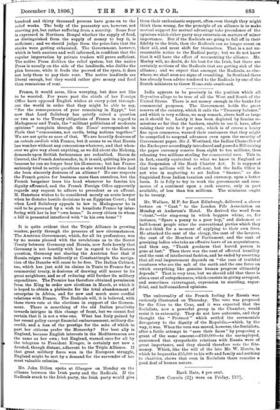It is quite evident that the Triple Alliance is growing
weaker, partly through the pressure of new circumstances. The Austrian Government, which, for all its professions, was by no means pleased with the revelations as to the Secret Treaty between Germany and Russia, now feels keenly that 'Germany is not heartily with her in regard to the Eastern question, Germany not sharing the Austrian fear that if Russia reigns even indirectly at Constantinople the naviga- tion of the Danube will cease to be free. The Italian Cabinet, too, which has just sold its claims in Tunis to France for a commercial treaty, is desirous of drawing still nearer to its great neighbour, and so of reducing still further its military expenditure. The Premier has therefore obtained permission from the King to order new elections in March, at which it is hoped to obtain a plebiscite for the total abandonment of enterprise in Africa, and for new and much more cordial relations with France. The Radicals will, it is believed, with these views vote at the elections in support of the Govern- raent. There is something of the old Italian proclivity towards intrigue in this change of front, but we cannot feel certain that it is not a wise one. What has Italy gained by her recent policy except financial embarrassment, military dis- credit, and a loss of the prestige for the sake of which in part her citizens prefer the Monarchy P Her best ally is England, because English interests in the Mediterranean are the same as her own ; but England, warned once for all by the telegram to President Kruger, is certainly not now a devoted, though distant, adherent to the Triple Alliance. If that great military force won in the European struggle, England might be met by a demand for the surrender of her most valuable colonies.










































 Previous page
Previous page